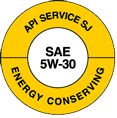 Fixing a car that is noticeably out of tune or has failed an emissions test can improve its gas mileage by an average of 4 percent, though results vary based on the kind of repair and how well it is done.
Fixing a car that is noticeably out of tune or has failed an emissions test can improve its gas mileage by an average of 4 percent, though results vary based on the kind of repair and how well it is done.
Fixing a serious maintenance problem, such as a faulty oxygen sensor, can improve your mileage by as much as 40 percent.
Fuel Economy Benefit: 4% Equivalent Gasoline Savings: $0.11/gallon Keep Tires Properly Inflated
Keep Tires Properly Inflated
 You can improve your gas mileage by around 3.3 percent by keeping your tires inflated to the proper pressure. Under-inflated tires can lower gas mileage by 0.3 percent for every 1 psi drop in pressure of all four tires. Properly inflated tires are safer and last longer.
You can improve your gas mileage by around 3.3 percent by keeping your tires inflated to the proper pressure. Under-inflated tires can lower gas mileage by 0.3 percent for every 1 psi drop in pressure of all four tires. Properly inflated tires are safer and last longer.
The proper tire pressure for your vehicle is usually found on a sticker in the driver’s side door jamb or the glove box and in your owner’s manual. Do not use the maximum pressure printed on the tire’s sidewall.
Fuel Economy Benefit: up to 3% Equivalent Gasoline Savings: up to $0.08/gallon Use the Recommended Grade of Motor Oil
Use the Recommended Grade of Motor Oil
 You can improve your gas mileage by 1-2 percent by using the manufacturer’s recommended grade of motor oil. For example, using 10W-30 motor oil in an engine designed to use 5W-30 can lower your gas mileage by 1-2 percent. Using 5W-30 in an engine designed for 5W-20 can lower your gas mileage by 1-1.5 percent. Also, look for motor oil that says “Energy Conserving” on the API performance symbol to be sure it contains friction-reducing additives.
Fuel Economy Benefit:
1-2%
Equivalent Gasoline Savings:
$0.03-$0.05/gallon
You can improve your gas mileage by 1-2 percent by using the manufacturer’s recommended grade of motor oil. For example, using 10W-30 motor oil in an engine designed to use 5W-30 can lower your gas mileage by 1-2 percent. Using 5W-30 in an engine designed for 5W-20 can lower your gas mileage by 1-1.5 percent. Also, look for motor oil that says “Energy Conserving” on the API performance symbol to be sure it contains friction-reducing additives.
Fuel Economy Benefit:
1-2%
Equivalent Gasoline Savings:
$0.03-$0.05/gallon
 NEW INFORMATION:
NEW INFORMATION:Replacing a Clogged Air Filter on Modern Cars Improves Performance but Not MPG
 A new study shows that replacing a clogged air filter on cars with fuel-injected, computer-controlled gasoline engines does not improve fuel economy but it can improve acceleration time by around 6 to 11 percent. This kind of engine is prevalent on most gasoline cars manufactured from the early 1980s onward.
A new study shows that replacing a clogged air filter on cars with fuel-injected, computer-controlled gasoline engines does not improve fuel economy but it can improve acceleration time by around 6 to 11 percent. This kind of engine is prevalent on most gasoline cars manufactured from the early 1980s onward.
Tests suggest that replacing a clogged air filter on an older car with a carbureted engine may improve fuel economy 2 to 6 percent under normal replacement conditions or up to 14 percent if the filter is so clogged that it significantly affects drivability.
The effect of a clogged air filter on diesel vehicles will be tested in the near future.
 Note: Cost savings are based on an assumed fuel price of $2.67/gallon.
Data Sources
Note: Cost savings are based on an assumed fuel price of $2.67/gallon.
Data Sources
Information on the impact of air filter condition on fuel economy is based on a study by Kevin Norman, Shean Huff, and Brian West, Effect of Intake Air Filter Condition on Vehicle Fuel Economy, Oak Ridge National Laboratory, 2009.
Estimates for fuel savings from vehicle maintenance, keeping tires properly inflated, and using the recommended grade of motor oil based on Energy and Environmental Analysis, Inc., Owner Related Fuel Economy Improvements, Arlington, Virginia, 2001.
**Some documents on this page are provided as Adobe Portable Document Format (PDF) files. Any PDF file can be downloaded, viewed on screen, and printed using the Adobe Acrobat Reader software. This free software can be downloaded from the Adobe Web site. Installation and setup instructions are provided on this site.
http://www.fueleconomy.gov/feg/maintain.shtml
Peak Kia of Littleton
Toll Free (888) 606-5252
No comments:
Post a Comment